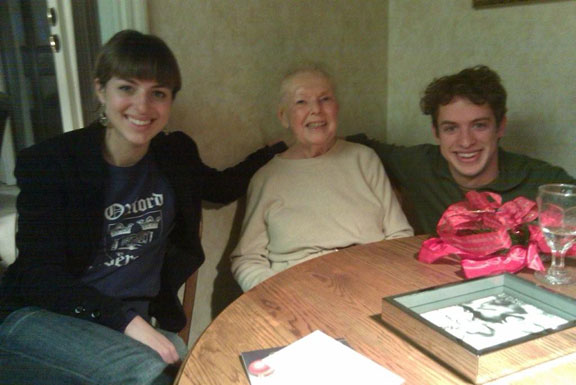
It is a pleasure to introduce myself as a new member of the John A. Hartford Foundation staff. In the brief two months that I have been with the Foundation, I have felt overwhelmingly inspired by the dedication and passion of my colleagues and the tremendous amount of progress made by the Foundation’s grantees toward our shared mission of improving the health of older Americans.
As a California native, I came to New York City fresh out of undergraduate education at UC Santa Barbara and jumped into management consulting for nonprofit and philanthropic organizations. This work introduced me to the importance of philanthropy as an agent for social change. Prior to joining the Foundation, I worked with the New York City Department of Health and Mental Hygiene’s Primary Care Information Project (PCIP). This Mayoral Initiative seeks to improve the quality of care in underserved communities through the use of health information technology (HIT) and helps NYC primary care providers achieve “Meaningful Use” as defined by the federal government. My work with PCIP introduced me to the lack of and the need for patient-centeredness and care transitions, which are vital to improving health care delivery and reducing costs. At PCIP, I began focusing my career on improving the quality of health care for all Americans.
When I ask myself what “health and aging” means to me, I reflect upon how my experience with the Department of Health opened my eyes to the critical need for health care reform. Along with other groups with special needs, seniors in America often struggle to gain access to quality health care. The complex needs of older adults are often misaligned with the payment structure of our health care model and the incentives it creates for health care providers. As a result, there are too few providers trained to care for the complexities of aging. By improving the health of older Americans, we work toward improving the health of all Americans. It is often said that a society is measured by how it treats its weakest members. More specifically, I think of this statement by Pearl S. Buck in her book My Several Worlds: “Our society must make it right and possible for old people not to fear the young or be deserted by them, for the test of a civilization is in the way that it cares for its helpless members.” As a young adult, I feel a duty to serve the underserved, and I am pleased to find this calling aligned with the mission of the John A. Hartford Foundation.
Personally, I am also motivated to improve the health and the quality of health care for elders as it relates to my own family. Some of the Hartford Foundation’s innovative programs, such as the American Academy of Nursing’s Geropsychiatric Nursing Collaborative (GPNC; designed to help improve how nurses are educated to care for elders suffering depression, dementia, and other mental health disorders) and Project IMPACT at the University of Washington (a model of care dedicated to testing and treating depression in older adults in the primary care setting), make me think of my grandmother, who quietly suffered from late-life depression. Unfortunately, the disease took her life almost exactly one year before I began my work with the Foundation. Programs like these could have been instrumental in helping to better diagnose and treat my grandmother’s mental health needs, which were largely overshadowed and compounded by her physical decline. However, my grief is assuaged knowing that health care leaders like those from GPNC and Project IMPACT recognize that older adults have the highest rate of suicide in the United States, and they are impassioned to help integrate the many complicated layers of mental health into all aspects of geriatrics. The Hartford Foundation grantees are true trailblazers who are fighting for comprehensive, coordinated, and quality care for older Americans.
It gives me hope that these grantees are helping to lead health care in the right direction by addressing the needs of older Americans--our grandmothers and grandfathers, mothers and fathers. Over the last 30 years, the Hartford Foundation’s dedication to health and aging programs has laid the foundation for real change in how older adults experience our health care system. In the years to come, I look forward to the work ahead to advance the shared mission of the John A. Hartford Foundation and its grantees.
